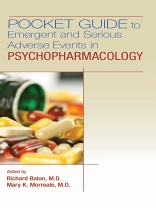When prescribed appropriately, most psychotropic medications are fairly safe. Although some side effects are common and even expected, occasional serious—and even life-threatening—adverse effects may arise that require immediate intervention. The Pocket Guide to Emergent and Serious Adverse Events in Psychopharmacology focuses on the latter. With chapters written by a combination of experts and novices in the field, this guide provides a summary of the extant knowledge of effects that include:
• Acute dystonia• Cardiac emergencies• Discontinuation and withdrawal• Neuroleptic malignant syndrome• Overdose
Designed to be easily referenced, chapters are arranged alphabetically and feature sections on recognition and detection, culprit medications, assessment, management, and follow-up treatment. Concise in format and broad in scope, this reference is particularly useful for psychopharmacology beginners but serves to reinforce for all readers the importance of frequent communication with patients and their families.
Inhoudsopgave
Introduction: The Art of Prescribing and ‘Surviving’ Emergent Serious Side Effects in Psychopharmacology Chapter 1. Acute dystonia Chapter 2. Agitation Chapter 3. Agranulocytosis with clozapine and other psychotropic medications Chapter 4. Benzodiazepines and opioids divided and together Chapter 5. Cardiac emergencies such as arrhythmias, QTc prolongation, and cardiomyopathy Chapter 6. Discontinuation of psychotropic medications Chapter 7. Hepatotoxicity of psychotropic medications Chapter 8. Hypertensive crisis and dietary or drug violation with monoamine oxidase inhibitors Chapter 9. Hyponatremia, especially in older adults Chapter 10. Neuroleptic malignant syndrome Chapter 11. Ocular side effects of psychotropic medications Chapter 12. Overdoses of psychotropic medications: antidepressants, lithium, and antipsychotics Chapter 13. Polypharmacy and acute side effects Chapter 14. Pregnancy: to stop or not to stop Chapter 15. Psychopharmacological seizure risk management Chapter 16. Serotonin syndrome Chapter 17. Substances with addictive potential and psychotropic medications Chapter 18. Tardive dyskinesia
Over de auteur
Richard Balon, M.D., is Professor in the Departments of Psychiatry and Behavioral Neurosciences and Anesthesiology and Associate Chair for Education and Faculty Affairs, and Program Director in the Department of Psychiatry and Behavioral Neurosciences at Wayne State University School of Medicine in Detroit, Michigan.
Mary K. Morreale, M.D., is Professor in the Department of Psychiatry and Behavioral Neurosciences at Wayne State University School of Medicine in Detroit, Michigan, and affiliated with Karmanos Cancer Center.












